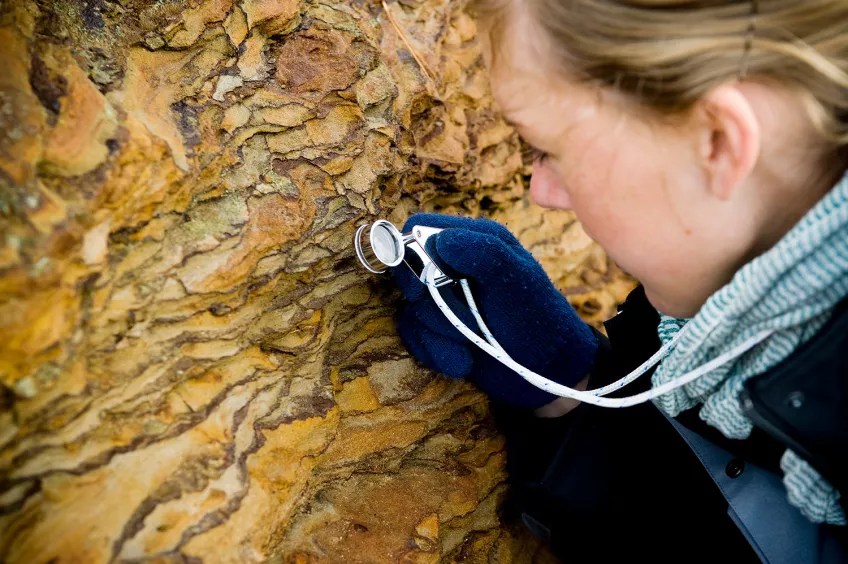Doctoral studies
Do you have a university degree and have found a subject that you are passionate about and want to study in depth? Whether you have just finished your studies, or are already established in the labour market, doctoral studies could be the next exciting step in your career.
About the programme
Third-cycle education can comprise either two or four years of full-time studies and lead to two different degrees:
- Licentiate degree consisting of 120 credits, equivalent to two years of full-time studies. The Licentiate degree is usually a milestone on the way to a doctoral degree.
- Doctoral degree consisting of 240 credits, equivalent to four years of full-time studies. Almost all doctoral students at the Faculty of Science have a doctoral degree as their final goal.
As a doctoral student, you are admitted to one of the faculty's more than 20 third-cycle subjects. You are usually employed through a doctoral studentship. The University regularly advertises vacant doctoral studentships to which you can apply if you meet the admission requirements.
Find vacant doctoral studentships (lunduniversity.lu.se)
The programme includes, among other things, courses, seminars and a research assignment that will result in a licentiate thesis or a doctoral thesis. You can also participate in one or more graduate schools on different themes. The graduate schools offer courses, workshops, seminars and networking opportunities.
Once you have completed all parts of your programme, you apply for a degree certificate. After receiving your degree, you can work as a researcher at a university or a company, for example.
Subjects
The Faculty of Science has more than 20 third-cycle subjects. For each subject there is a general syllabus in which you can read about admission requirements, components of the programme and more.
Centre for Environmental and Climate Science
Subjects:
- Computational Science (PDF, 243 kB, opens in a new tab)
- Environmental Science (PDF, 593 kB, opens in a new tab)
- Theoretical Physics with specialisation in Computational Biolog (PDF, 595 kB, opens in a new tab)
Centre for Mathematical Sciences
Subjects:
- Mathematical Statistics (PDF, 665 kB, opens in a new tab)
- Mathematics (PDF, 581 kB, opens in a new tab)
- Numerical Analysis (PDF, 593 kB, opens in a new tab)
Department of Biology
Subject:
Biology (PDF, 759 kB, opens in a new tab)
Department of Chemistry
Subjects:
- Analytical Chemistry (PDF, 569 kB, opens in a new tab)
- Biochemistry (PDF, 574 kB, opens in a new tab)
- Chemical Physics (PDF, 630 kB, opens in a new tab)
- Computational Chemistry (PDF, 242 kB, new tab)
- Inorganic Chemistry (PDF, 574 kB, opens in a new tab)
- Molecular Biophysics (PDF, 575 kB, opens in a new tab)
- Organic Chemistry (PDF, 574 kB, opens in a new tab)
- Physical Chemistry (PDF, 573 kB, opens in a new tab)
Department of Geology
Subjects:
- Geobiosphere Science with a specialisation in Lithosphere and Palaeobiosphere Sciences (PDF, 592 kB, opens in a new tab)
- Geobiosphere Science with a specialisation in Quaternary Geology (PDF, 591 kB, opens in a new tab)
Department of Physical Geography and Ecosystem Science
Subjects:
- Geobiosphere Science, with specialisation in Geographical Information Science (PDF, 592 kB, opens in a new tab)
- Geobiosphere Science, with specialisation in Physical Geography and Ecosystem Science (PDF, 591 kB, opens in a new tab)
Department of Physics
Subjects:
- Astronomy and Astrophysic (PDF, 579 kB, opens in a new tab)
- Physics (PDF, 756 kB, opens in a new tab)
- Theoretical Physics with specialisation in Theoretical Physics (PDF, 593 kB, opens in a new tab)
Medical Radiation Physics
Subject:
Graduate schools
A graduate school offers, among other things, courses, workshops and seminars on a specific theme. The Faculty of Science has the following graduate schools:
- Admire (advanced microscopy research environment) – admire.lu.se
- Agenda 2030 – agenda2030graduateschool.lu.se
- Bioeconomy – cec.lu.se
- ClimBEco (biodiversity and ecosystem services in a changing climate) – climbeco.lu.se
- Compute (scientific discovery using computers) – compute.lu.se
- lntegrative Biology – biology.lu.se
- QDETAILSS (high quality detection and analysis of liquid and solid samples) – kilu.lu.se/internal
- XANADU (X-rays and neutrons for advanced sustainability research) – fysik.lu.se
Directors of third-cycle studies
Centre for Mathematical Sciences
Contact information for Sandra Pott – lunduniversity.lu.se
Department of Biology
Contact information for Klas Flärdh – lunduniversity.lu.se
Department of Chemistry
Contact information for Viveka Alfredsson – lunduniversity.lu.se
Department of Earth and Environmental Sciences (MGeo)
Contact information for Martin Berggren – lunduniversity.lu.se
Department of Physics
Contact information for Thomas Bensby – lunduniversity.lu.se
Medical Radiation Physics
Contact information for Ronnie Wirestam – lunduniversity.lu.se
